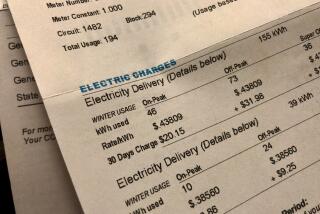Big Energy Firm Seeks Deal With State to End Suits
- Share via
SACRAMENTO — North Carolina-based Duke Energy, a major power generator accused of gouging California, has asked Gov. Gray Davis in a “wish list” to drop all state investigations and lawsuits into its pricing activities in exchange for some possible monetary concessions by the generator, a spokesman for the administration said Tuesday.
Davis spokesman Steve Maviglio said the offer was made in a secret 17-page letter from Duke to the governor’s attorney, Barry Goode. He said Goode, who signed a confidentiality agreement when he received the letter, forwarded it to Atty. Gen. Bill Lockyer, whose office is conducting an investigation into possible illegal practices by the generators.
“The letter asked that the state drop all investigations and take other steps,” Maviglio said. “The governor has not seen the letter and never agreed to any part of it.”
Maviglio said Davis first learned of the letter Tuesday during an interview with PBS “Frontline” correspondent Lowell Bergman.
Tom Williams, spokesman for Duke Energy North America, confirmed that his company had private settlement discussions with the governor’s office as early as March. The idea, he said, was to somehow end litigation against the company.
Williams would not disclose when the talks began or with whom company officials have met.
Asked how the governor could help Duke avoid the roughly half-dozen lawsuits filed against the company--at least one by a private attorney--Williams would say only that the discussions were “very preliminary.”
“The sense was that things could all be combined at some point--it was conceptual,” Williams said, adding: “We have done nothing wrong, but we want to get things moving. We have a big stake in this state.”
Duke invested $611 million to buy two big power plants at Morro Bay and Moss Landing from Pacific Gas & Electric in 1998. The company has announced plans to invest another $1.6 billion in rebuilding, modernizing and expanding the plants.
“When you have this amount of litigation to deal with in this kind of environment, it’s not imprudent to have preliminary and conceptual discussions to see how we can move forward,” Williams said.
Williams said some of the lawsuits aim to have Duke forgive some of the $110 million it is owed by PG&E; and Southern California Edison for power sold this fall and winter.
Unlike some companies, which sell most of their power into the high-priced spot market, Williams said, Duke contracts to sell 80% to 90% of its power to credit-worthy parties. Last July, Duke offered to sell electricity to utilities for $50 per megawatt-hour for the next five years--a deal that now appears cheap compared to spot market prices of $250 per megawatt-hour and more. Gov. Davis did not respond at the time to the Duke offer.
Along with a dozen other power sellers, Duke has been accused by the Federal Energy Regulatory Commission of overcharging for power. The commission has ordered Duke to justify its prices or rebate $20 million for power sold since January.
“The [FERC-ordered] refunds are stuff we haven’t even been paid for yet,” said Williams. He said the company charged more in January and February--through so-called “credit premiums”-- because of the risk of nonpayment that PG&E; and Edison posed. PG&E; has since filed for protection from creditors in Bankruptcy Court.
“We said a month ago we’d be happy to forgive or consider forgiving the credit premiums if we got paid for the power,” said Williams.
Attorney Michael Aguirre, a former federal prosecutor now representing California ratepayers in a class-action suit, sharply criticized the secret contacts between Duke and the Davis administration.
“They are getting together with nobody else involved to undo other people’s rights,” he said.
Aguirre said he does not believe the governor and Duke could legally terminate lawsuits and numerous investigations by other agencies.
One possible way such a move could be attempted, Aguirre said, would be for the state attorney general to file and then immediately settle a lawsuit against Duke, ostensibly on behalf of all citizens of California.
But he added: “I don’t believe it’s a viable legal theory. What they are proposing is essentially collusive.
“What is troubling is that the governor would engage in the kind of collusive behavior we suspect the alleged price fixers are engaged in,” Aguirre said. “It raises the specter that the governor is not acting in the public interest.
“This is why there needs to be a complete opening of the governor’s [energy] files.”
More to Read
Inside the business of entertainment
The Wide Shot brings you news, analysis and insights on everything from streaming wars to production — and what it all means for the future.
You may occasionally receive promotional content from the Los Angeles Times.










